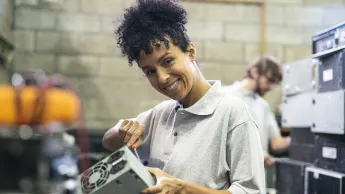Circular economy: solutions for a more sustainable future
- 2024-10-09
- Ulrike Scheffer
- Comment

People worldwide are involved in the ecological transformation of global business. Many Germany alumni are also considering how to succeed in reconciling economic development and how to combat the climate crisis. Reusing valuable resources will play a significant role in this.
Lots of Germany alumni are searching for opportunities to overcome the . Some are conducting research into this at universities in their home countries or even in Germany. Some search quite tangibly for practical solutions in their home region by founding green start-ups. An important aspect in the battle against progressive global warming and its consequences is the so-called circular economy. July saw international researchers and experts in the circular economy from the community of Germany alumni discussing how they can take action and the difficulties associated with this.
But what does a circular economy actually entail?In short, it mostly involves recycling. Raw materials that are included within products should be reused for as long as possible. The intention is for instance that electronic devices do not simply end up in the waste when they are no longer being used, but rather that the installed parts and raw materials are collected and recycled.
Smartphones as a source of raw materials
A smartphone, for example, contains metals that are very rare and therefore valuable. These include gold, palladium, gallium, germanium, indium, neodymium, tantalum, cobalt, lithium, platinum, tungsten, tin and rare earth metals. A single smartphone only contains small amounts of these metals. But since more than 1.5 billion smartphones are sold every year, there are substantial amounts that are required for production of these devices.
What is more: the people who mine these raw materials often work under conditions that are harmful to their health, and nature itself suffers due to the mining operations. The raw materials would continue to be used in a circular economy, but actually recycled rather than thrown away when disposing of a product. The traditional so-called linear economy is conversely designed in such a way that new raw materials are always used to manufacture new products that are difficult or even impossible to repair.
Companies should in the future also be able to reuse production waste and utilise it for energy generation. Electricity and thermal energy from waste incineration or derived as waste heat lost from machinery can for instance considerably reduce companies’ energy consumption and thus their CO2 emissions.
This is how a circular economy works (in German)
A strategy for establishing and maintaining a circular economy
The German government presented a strategy in June 2024 for establishing and maintaining a circular economy in Germany – the National Circular Economy Strategy (). The independent environment, development and human rights organisation ‘Germanwatch’ welcomed it: ‘This current draft has what it takes to once again make Germany a pioneer in the circular economy’, writes Luisa Denter, specialist in resource policy and circular economy at Germanwatch, in a statement. Albeit the government shouldn’t just hide behind vague formulations. ‘It must rapidly move towards implementation.’
‘The risks and social consequences of a circular economy must also be considered’
Daniel Perozo, an environmental economist and Germany alumnus from Brazil, says: ‘There are no theoretical models of how a circular economy impacts the global economy.’ He is currently doing his doctorate, conducting research and also teaching at the University of Brasilia as a temporary economics professor. Many start-ups and researchers may certainly have good ideas relating to specific technical solutions for implementing a circular economy, says Daniel Perozo. But scarcely anyone is considering the bigger picture. ‘We don’t for instance know the impact that a circular economy will have on gross domestic product.’
Daniel Perozo feels that the introduction of circular economies is an experiment associated with risks and social consequences which need to be considered – especially in Global South countries: people who collect recyclable material such as aluminium cans are often working in undignified conditions that may even be hazardous to their health. Such social consequences have not so far been taken into account. A circular economy therefore requires a legal framework. ‘We need to do it correctly’, is the appeal from Daniel Perozo.
Cities as forerunners for a circular economy
Piyush Dhawan, a sustainability expert from India and equally a Germany alumnus, is also dealing with the topic of circular economy. He is the project manager of a joint project involving Germany and the ASEAN states that involves the protection of marine ecosystems and solutions to .
is a major global problem. Not least because the production of plastic requires a lot of energy. It is therefore important that plastic waste is not merely thrown away, but is rather seen as a raw material from which new products can be manufactured. It would of course be even better to do without plastic to the greatest extent possible.
Piyush Dhawan says that cities are considered to be forerunners for the implementation of a circular economy. Because they have the resources, capital, data and talented individuals. ‘They are also centres of innovation and therefore uniquely positioned to support circular economy models, such as sharing models and recycling systems.’ He in particular sees examples of a functioning circular economy within nature. ‘A forest is an example of a perfect cycle of resources: water, carbon, minerals and other substances are always being converted into something new. Nothing is wasted.’
There are also now many approaches when it comes to the economy in terms of designing production processes in such a way that only very few new raw materials and external energy are required for a cycle to function. Unlike in nature, however, ecological transformations of the economy also necessitate consideration of the impact on people’s lives. There are still many open questions in relation to this topic.
